Haitham Hajjaj is palpably excited as he prepares to leave Gaza to attend the final matches of the FIFA World Cup in Qatar. The 48-year-old former footballer was part of the Palestinian national team from 1998 to 2005. His three teenage boys are today some of Gaza’s most promising football players. They want to follow in their father’s footsteps, and they have the advantage of having him as their coach. He is also my cousin.
I visited Haitham as he was set to join a trip sponsored by Gaza’s local equivalent of a sports ministry (the Higher Committee for Youth and Sports) to attend the World Cup finals, along with other former members of the Palestine national team from Gaza. It won’t be the first time for him in Qatar either. In 1998, he played against the Qatari national team and won the game for Palestine.
Winning was always a means to an end, to bring Palestine to the world, and the world into Palestine
When he had arrived in Qatar those years ago, he thought he had finally achieved what he’d been waiting for — to see the crowds of thousands carrying Palestinian flags, sporting Palestinian national symbols, and cheering for a free Palestine. He wanted to reach the world through football and to bring the Palestinian struggle to a world audience.
This is because Haitham’s dream, as well as the dream of his fellow team members, was never the same as the other teams that entered the competition to win.
Winning, bringing home a prize or a cup, was always just a side goal, a means to an end — to bring Palestine to the world, and the world into Palestine.
“We played for our martyrs, for their mothers, for our freedom,” Haitham said. “We championed our struggle, and it motivated us.”
Haitham’s twenties were a period of self-discovery and ambition. He and seven of his teammates were from the Gaza Strip, each fulfilling their dream of playing for the national football team. When they made it to Qatar, it seemed like a validation of their ambitions to bring recognition to Palestine. The support for the Palestinian struggle that was evident in the stadiums was heartening to see.
The veterans from the former national team today encourage the younger players to be motivated by the same ambitions that drove them — to get on the national team and highlight the daily abuses of the Israeli occupation against their people.
Winning was an indirect way of fulfilling their ambition. The ambition was never personal — it was simply about bringing visibility to the struggle. They dreamed of reaching even wider audiences to garner the respect of the world through their skill and professionalism.
Haitham repeated this several times throughout the interview. In the guest room where he received us in his home in the Shuja’iyya neighborhood, east of Gaza City, he pulled out an album of old photos of himself when he used to play on the team. That was when his sons came in, hovering over us as they examined the photos of a much younger-looking Haitham.
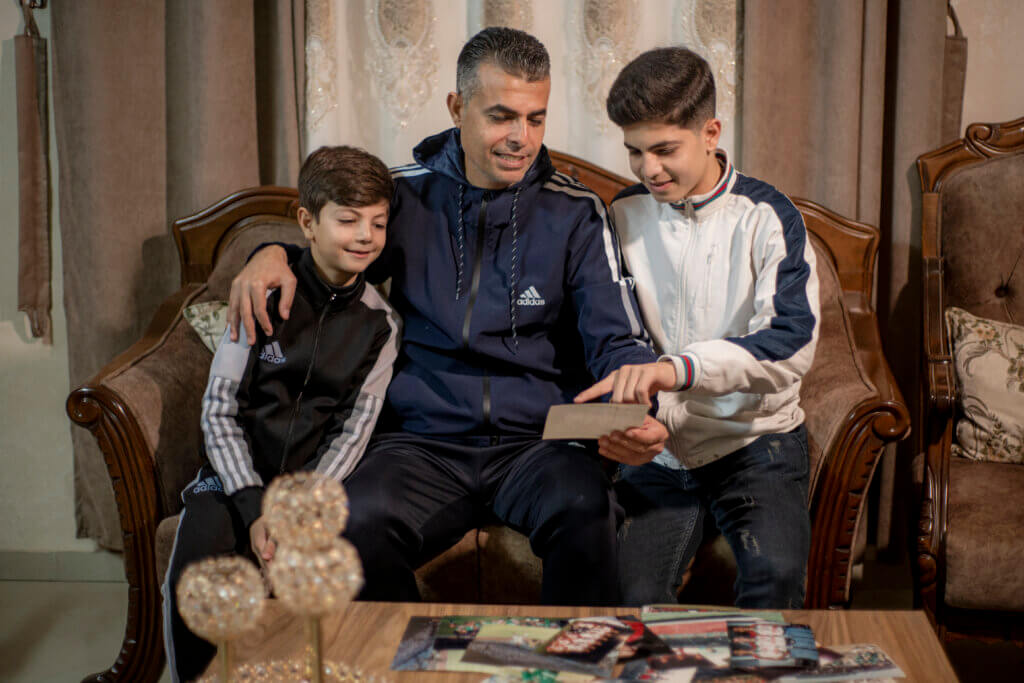
When Haitham spoke about those days, which you get a distinct impression were what he considered his golden years, his sons would suddenly fall silent and listen to him carefully. It doesn’t take much observation to know that they, too, hope to one day play in the national team.
“I represented my country in one united language, the language of football,” Haitham told us. “I got the chance to tell the world about how we had to spend five nights at the airports because Israel denied us our freedom, how in spite of that we managed to show up to the field and play.”
Haitham lifts up the number 7 football jersey he wore when he played for the national team, a memento that now serves as an heirloom in his family.
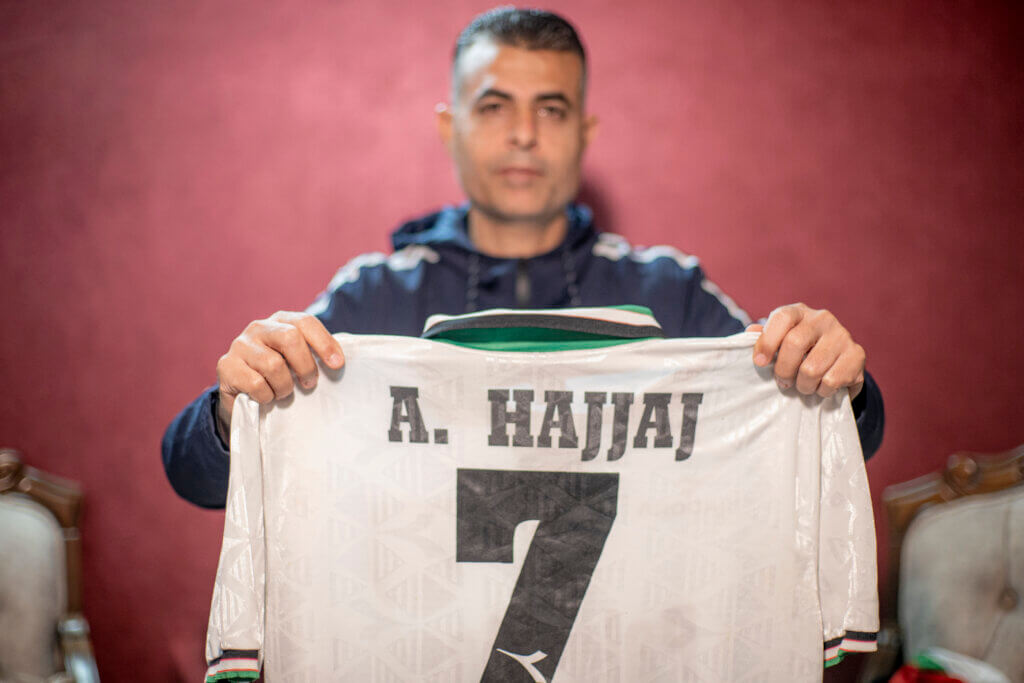
No special treatment
During his years on the team, Haitham and his teammates did not receive special treatment by virtue of representing Palestine. If anything, it exposed them to even greater obstacles that Israel put in their way, fragmenting the national team.
Most importantly, Israel denied the team members freedom of movement. The team hardly traveled to other countries for matches because of the travel difficulties.
“At the borders, we weren’t treated like VIPs, we didn’t receive any special treatment,” Haithan said. “We’ve never even had a national football stadium to invite other countries’ teams to play on our home field.”
Whenever the Palestine team needed to train together, they would play at the Jericho stadium in the West Bank. Players from Gaza would have to travel to join the rest of the team members, who were from the West Bank and Jerusalem. The team also included Palestinians holding nominal Israeli citizenship. Reaching the Jericho stadium would prove difficult for players from Gaza, while the other players faced the same obstacles when they had to travel to Gaza for practice there. The Israeli regime was impeding the very ability of the team to train normally and improve.

Because they had no national stadium, they would be hosted by neighboring Arab countries. “This was extremely irritating to us,” Haitham said. “Our team was unable to meet in its own country, to play on our own land, because of the occupation.”
Although now retired, Haitham and his former teammates remain as passionate as ever for the sport they so love. As many of them are near their 50s, they continue to meet up and play football from time to time. They even sometimes host small competitions and participate in them.
As for the young generation, Haitham’s three boys have all joined different local clubs. Their father has always encouraged them, telling them that they should chase their dreams and that maybe someday they too might be able to make the national team.
But times have also changed. Gaza is entering the 15th year of its blockade, as travel in and out of the coastal strip is routinely restricted or entirely shut off, while the state of infrastructure in Gaza inspires little hope for the provision of proper resources for aspiring football players. Perhaps most importantly, the siege has meant that the Palestine national team does not have players from Gaza anymore.
His son Omar wants to change that. Only 17, he’s getting ready to join the national team whenever he gets the chance.
“I know it’s really hard for me to join the national team because I’m a Gaza resident,” Omar admitted. “It will be difficult for me to join the other players, and it will be hard to leave Gaza in the first place to get professional training.”
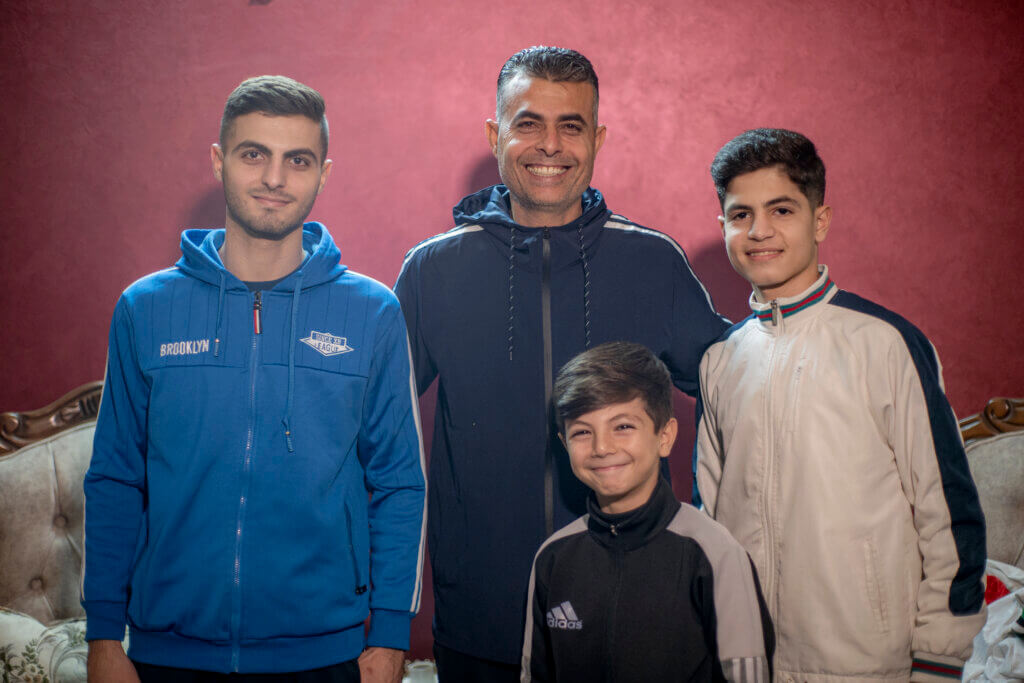
The reason they would have to travel abroad is evident. “What do our capacities look like in Gaza?” Haitham asks rhetorically. “Extremely poor. We can’t get any international trainers, we can’t play with other teams.”
And there was also the matter of the inevitable Israeli aggression that disrupted normal life. “Many times, we would play in a local competition in Gaza, and then a [Israeli] war would break out, and we would be locked back in our homes,” Haitham says.
That’s why Haitham, far from discouraging his sons from leaving, points out that “outside of Gaza there are huge clubs for all sports, and families push their kids to play because they have stable conditions that can offer that opportunity.”
There is also institutional negligence. The football clubs in Gaza used to receive a total of $25,000 per month for team salaries and expenses — part of a “presidential scholarship” allotted to some Palestinian football clubs. But three years ago, these payments stopped.
“There are so many super-talented players, but most of them are not committed to the club. They’re too busy securing a living for their families. They have to choose between giving their time to play and letting their families starve,” Haitham clarifies.
Despite these obstacles, it does little to dampen Omar’s enthusiasm. “If there is one thing this World Cup has taught us, it is that nothing is impossible.” Omar is beaming with pride as he says this.
He is, of course, referring to the spectacular and historic performance that the Moroccan national team has shown in this year’s Mondial, as Morocco played its way past the national teams of three former colonial powers (Belgium, Spain, and Portugal), making its way to the semi-final round — the first Arab country to do so in history. What Morocco did was give hope and pride to an entire generation across the Arab world that has become too accustomed to the sting of defeat.
It has given hope to people like Omar not to be content with modest goals.
While Haitham is certainly an idol to his boys, Omar doesn’t just want to be on the national team.
“I want to bring the World Cup to Palestine,” he declares. “I know it is possible. And I won’t stop dreaming of it.”
Tareq S. Hajjaj
Tareq S. Hajjaj is the Mondoweiss Gaza Correspondent, and a member of Palestinian Writers Union.
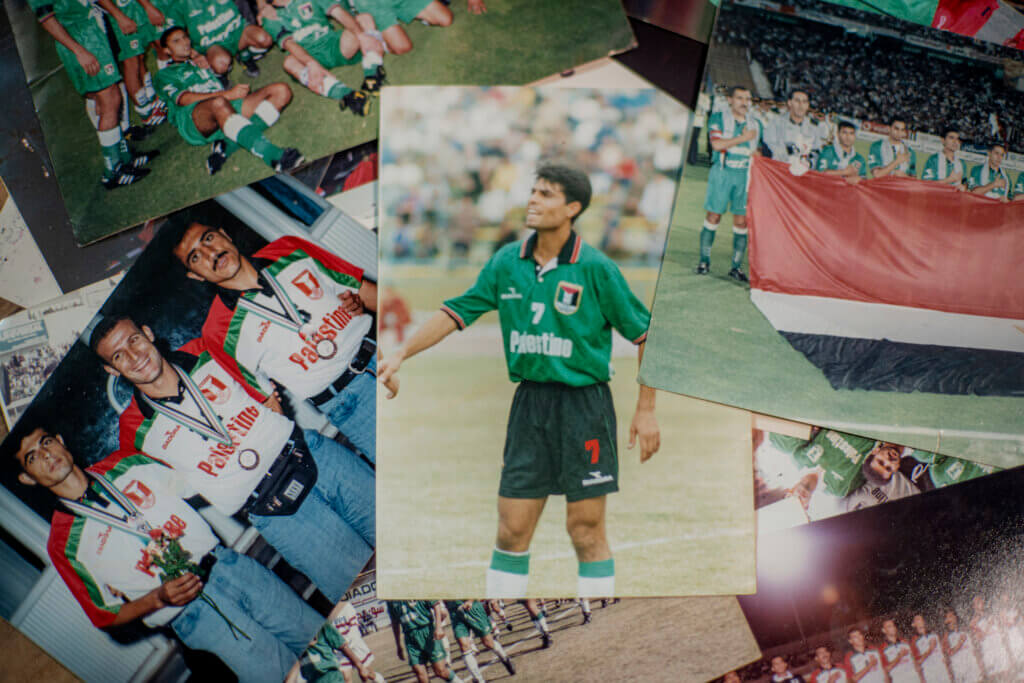
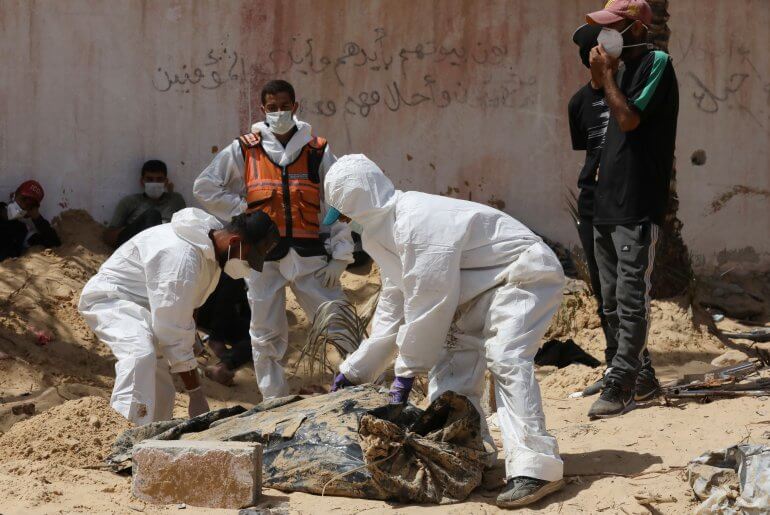
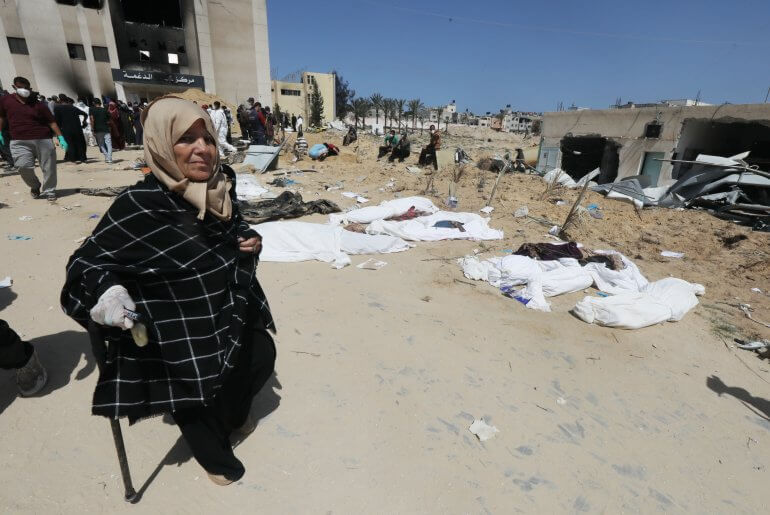
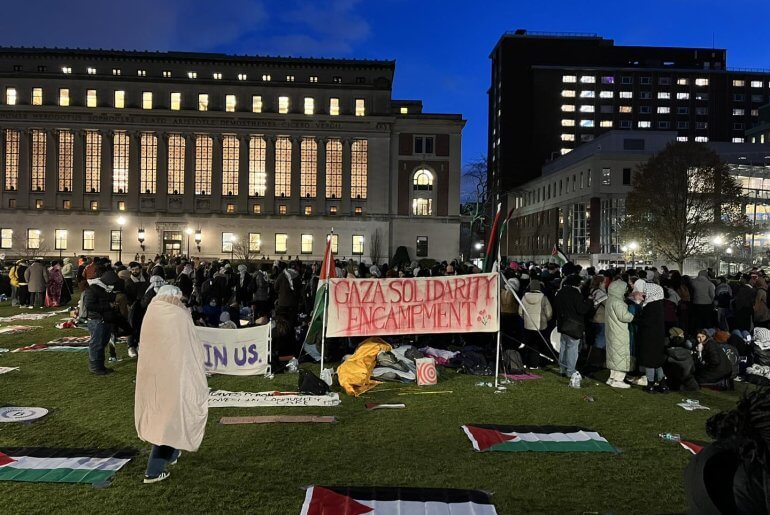
I am in the process of reading “Our Vision For Liberation”, by Ramzy Baroud and Ilan Pappe. Your Stories Tareq would very easily enhance this book. Well done a great read.
“You probably know” said the pretzel as he twisted himself.
An unrealistic aspiration. The Palestinians have no serious sports organizations. There are no stadiums. Football is at a low level there. It does not seem to me that in the next 50 years the Palestinians will be able to build football culture at a sufficient level. Only dirty politics will ignore these facts, and then will derail the world cup event.